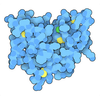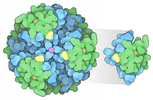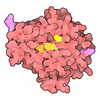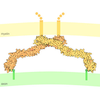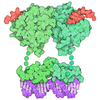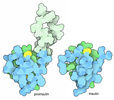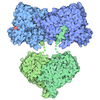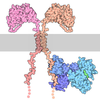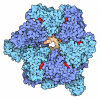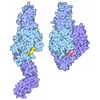[English] 日本語
 Yorodumi
Yorodumi- PDB-7z8l: Cytoplasmic dynein light intermediate chain (B1) bound to the mot... -
+ Open data
Open data
- Basic information
Basic information
| Entry | Database: PDB / ID: 7z8l | ||||||||||||
|---|---|---|---|---|---|---|---|---|---|---|---|---|---|
| Title | Cytoplasmic dynein light intermediate chain (B1) bound to the motor domain (A2). | ||||||||||||
 Components Components | (Cytoplasmic dynein 1 ... Dynein) x 2 Dynein) x 2 | ||||||||||||
 Keywords Keywords |  STRUCTURAL PROTEIN / STRUCTURAL PROTEIN /  Dynein / Dynein /  dynactin / dynactin /  cargo transport / activating adaptor / cargo transport / activating adaptor /  cytoskeleton cytoskeleton | ||||||||||||
| Function / homology |  Function and homology information Function and homology informationdynein heavy chain binding / positive regulation of intracellular transport / regulation of metaphase plate congression / establishment of spindle localization / positive regulation of spindle assembly /  P-body assembly / P-body assembly /  dynein complex / COPI-independent Golgi-to-ER retrograde traffic / minus-end-directed microtubule motor activity / dynein complex / COPI-independent Golgi-to-ER retrograde traffic / minus-end-directed microtubule motor activity /  cytoplasmic dynein complex ...dynein heavy chain binding / positive regulation of intracellular transport / regulation of metaphase plate congression / establishment of spindle localization / positive regulation of spindle assembly / cytoplasmic dynein complex ...dynein heavy chain binding / positive regulation of intracellular transport / regulation of metaphase plate congression / establishment of spindle localization / positive regulation of spindle assembly /  P-body assembly / P-body assembly /  dynein complex / COPI-independent Golgi-to-ER retrograde traffic / minus-end-directed microtubule motor activity / dynein complex / COPI-independent Golgi-to-ER retrograde traffic / minus-end-directed microtubule motor activity /  cytoplasmic dynein complex / retrograde axonal transport / dynein light intermediate chain binding / nuclear migration / centrosome localization / dynein intermediate chain binding / microtubule-based movement / Amplification of signal from unattached kinetochores via a MAD2 inhibitory signal / cytoplasmic microtubule / COPI-mediated anterograde transport / cytoplasmic microtubule organization / cytoplasmic dynein complex / retrograde axonal transport / dynein light intermediate chain binding / nuclear migration / centrosome localization / dynein intermediate chain binding / microtubule-based movement / Amplification of signal from unattached kinetochores via a MAD2 inhibitory signal / cytoplasmic microtubule / COPI-mediated anterograde transport / cytoplasmic microtubule organization /  stress granule assembly / Mitotic Prometaphase / EML4 and NUDC in mitotic spindle formation / regulation of mitotic spindle organization / axon cytoplasm / Loss of Nlp from mitotic centrosomes / Loss of proteins required for interphase microtubule organization from the centrosome / Recruitment of mitotic centrosome proteins and complexes / Resolution of Sister Chromatid Cohesion / Recruitment of NuMA to mitotic centrosomes / HSP90 chaperone cycle for steroid hormone receptors (SHR) in the presence of ligand / Anchoring of the basal body to the plasma membrane / MHC class II antigen presentation / AURKA Activation by TPX2 / mitotic spindle organization / cellular response to nerve growth factor stimulus / stress granule assembly / Mitotic Prometaphase / EML4 and NUDC in mitotic spindle formation / regulation of mitotic spindle organization / axon cytoplasm / Loss of Nlp from mitotic centrosomes / Loss of proteins required for interphase microtubule organization from the centrosome / Recruitment of mitotic centrosome proteins and complexes / Resolution of Sister Chromatid Cohesion / Recruitment of NuMA to mitotic centrosomes / HSP90 chaperone cycle for steroid hormone receptors (SHR) in the presence of ligand / Anchoring of the basal body to the plasma membrane / MHC class II antigen presentation / AURKA Activation by TPX2 / mitotic spindle organization / cellular response to nerve growth factor stimulus /  filopodium / RHO GTPases Activate Formins / filopodium / RHO GTPases Activate Formins /  kinetochore / microtubule cytoskeleton organization / Aggrephagy / HCMV Early Events / Separation of Sister Chromatids / azurophil granule lumen / kinetochore / microtubule cytoskeleton organization / Aggrephagy / HCMV Early Events / Separation of Sister Chromatids / azurophil granule lumen /  Regulation of PLK1 Activity at G2/M Transition / late endosome / positive regulation of cold-induced thermogenesis / Regulation of PLK1 Activity at G2/M Transition / late endosome / positive regulation of cold-induced thermogenesis /  cell cortex / cell cortex /  microtubule / microtubule /  cell division / cell division /  centrosome / Neutrophil degranulation / centrosome / Neutrophil degranulation /  ATP hydrolysis activity / ATP hydrolysis activity /  RNA binding / extracellular exosome / extracellular region / RNA binding / extracellular exosome / extracellular region /  ATP binding / ATP binding /  membrane / identical protein binding / membrane / identical protein binding /  cytosol cytosolSimilarity search - Function | ||||||||||||
| Biological species |   Homo sapiens (human) Homo sapiens (human) | ||||||||||||
| Method |  ELECTRON MICROSCOPY / ELECTRON MICROSCOPY /  single particle reconstruction / single particle reconstruction /  cryo EM / Resolution: 4.9 Å cryo EM / Resolution: 4.9 Å | ||||||||||||
 Authors Authors | Chaaban, S. / Carter, A.P. | ||||||||||||
| Funding support |  United Kingdom, European Union, 3items United Kingdom, European Union, 3items
| ||||||||||||
 Citation Citation |  Journal: Nature / Year: 2022 Journal: Nature / Year: 2022Title: Structure of dynein-dynactin on microtubules shows tandem adaptor binding. Authors: Sami Chaaban / Andrew P Carter /  Abstract: Cytoplasmic dynein is a microtubule motor that is activated by its cofactor dynactin and a coiled-coil cargo adaptor. Up to two dynein dimers can be recruited per dynactin, and interactions between ...Cytoplasmic dynein is a microtubule motor that is activated by its cofactor dynactin and a coiled-coil cargo adaptor. Up to two dynein dimers can be recruited per dynactin, and interactions between them affect their combined motile behaviour. Different coiled-coil adaptors are linked to different cargos, and some share motifs known to contact sites on dynein and dynactin. There is limited structural information on how the resulting complex interacts with microtubules and how adaptors are recruited. Here we develop a cryo-electron microscopy processing pipeline to solve the high-resolution structure of dynein-dynactin and the adaptor BICDR1 bound to microtubules. This reveals the asymmetric interactions between neighbouring dynein motor domains and how they relate to motile behaviour. We found that two adaptors occupy the complex. Both adaptors make similar interactions with the dyneins but diverge in their contacts with each other and dynactin. Our structure has implications for the stability and stoichiometry of motor recruitment by cargos. | ||||||||||||
| History |
|
- Structure visualization
Structure visualization
| Structure viewer | Molecule:  Molmil Molmil Jmol/JSmol Jmol/JSmol |
|---|
- Downloads & links
Downloads & links
- Download
Download
| PDBx/mmCIF format |  7z8l.cif.gz 7z8l.cif.gz | 504.8 KB | Display |  PDBx/mmCIF format PDBx/mmCIF format |
|---|---|---|---|---|
| PDB format |  pdb7z8l.ent.gz pdb7z8l.ent.gz | 332.6 KB | Display |  PDB format PDB format |
| PDBx/mmJSON format |  7z8l.json.gz 7z8l.json.gz | Tree view |  PDBx/mmJSON format PDBx/mmJSON format | |
| Others |  Other downloads Other downloads |
-Validation report
| Arichive directory |  https://data.pdbj.org/pub/pdb/validation_reports/z8/7z8l https://data.pdbj.org/pub/pdb/validation_reports/z8/7z8l ftp://data.pdbj.org/pub/pdb/validation_reports/z8/7z8l ftp://data.pdbj.org/pub/pdb/validation_reports/z8/7z8l | HTTPS FTP |
|---|
-Related structure data
| Related structure data |  14556MC  7z8fC 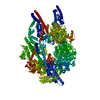 7z8gC 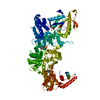 7z8hC  7z8iC 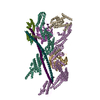 7z8jC 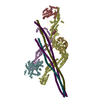 7z8kC 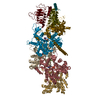 7z8mC M: map data used to model this data C: citing same article ( |
|---|---|
| Similar structure data | Similarity search - Function & homology  F&H Search F&H Search |
- Links
Links
- Assembly
Assembly
| Deposited unit | 
|
|---|---|
| 1 |
|
- Components
Components
-Cytoplasmic dynein 1 ... , 2 types, 2 molecules fq
| #1: Protein | Mass: 533055.125 Da / Num. of mol.: 1 / Mutation: E1518K, R1567K Source method: isolated from a genetically manipulated source Source: (gene. exp.)   Homo sapiens (human) / Gene: DYNC1H1, DHC1, DNCH1, DNCL, DNECL, DYHC, KIAA0325 / Production host: Homo sapiens (human) / Gene: DYNC1H1, DHC1, DNCH1, DNCL, DNECL, DYHC, KIAA0325 / Production host:   Spodoptera frugiperda (fall armyworm) / References: UniProt: Q14204 Spodoptera frugiperda (fall armyworm) / References: UniProt: Q14204 |
|---|---|
| #2: Protein | Mass: 54173.156 Da / Num. of mol.: 1 Source method: isolated from a genetically manipulated source Source: (gene. exp.)   Homo sapiens (human) / Gene: DYNC1LI2, DNCLI2, LIC2 / Production host: Homo sapiens (human) / Gene: DYNC1LI2, DNCLI2, LIC2 / Production host:   Spodoptera frugiperda (fall armyworm) / References: UniProt: O43237 Spodoptera frugiperda (fall armyworm) / References: UniProt: O43237 |
-Non-polymers , 4 types, 5 molecules 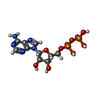
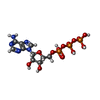

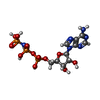



| #3: Chemical | ChemComp-ADP /  Adenosine diphosphate Adenosine diphosphate |
|---|---|
| #4: Chemical | ChemComp-ATP /  Adenosine triphosphate Adenosine triphosphate |
| #5: Chemical | ChemComp-MG / |
| #6: Chemical |
-Details
| Has ligand of interest | N |
|---|
-Experimental details
-Experiment
| Experiment | Method:  ELECTRON MICROSCOPY ELECTRON MICROSCOPY |
|---|---|
| EM experiment | Aggregation state: PARTICLE / 3D reconstruction method:  single particle reconstruction single particle reconstruction |
- Sample preparation
Sample preparation
| Component |
| |||||||||||||||||||||||||||||||||||||||||||||
|---|---|---|---|---|---|---|---|---|---|---|---|---|---|---|---|---|---|---|---|---|---|---|---|---|---|---|---|---|---|---|---|---|---|---|---|---|---|---|---|---|---|---|---|---|---|---|
| Molecular weight |
| |||||||||||||||||||||||||||||||||||||||||||||
| Source (natural) |
| |||||||||||||||||||||||||||||||||||||||||||||
| Source (recombinant) |
| |||||||||||||||||||||||||||||||||||||||||||||
| Buffer solution | pH: 7.2 | |||||||||||||||||||||||||||||||||||||||||||||
| Buffer component |
| |||||||||||||||||||||||||||||||||||||||||||||
| Specimen | Embedding applied: NO / Shadowing applied: NO / Staining applied : NO / Vitrification applied : NO / Vitrification applied : YES : YES | |||||||||||||||||||||||||||||||||||||||||||||
Vitrification | Instrument: FEI VITROBOT MARK IV / Cryogen name: ETHANE / Humidity: 100 % / Chamber temperature: 293.15 K / Details: 20 second incubation |
- Electron microscopy imaging
Electron microscopy imaging
| Experimental equipment |  Model: Titan Krios / Image courtesy: FEI Company |
|---|---|
| Microscopy | Model: FEI TITAN KRIOS |
| Electron gun | Electron source : :  FIELD EMISSION GUN / Accelerating voltage: 300 kV / Illumination mode: FLOOD BEAM FIELD EMISSION GUN / Accelerating voltage: 300 kV / Illumination mode: FLOOD BEAM |
| Electron lens | Mode: BRIGHT FIELD Bright-field microscopy / Nominal magnification: 81000 X / Nominal defocus max: 4000 nm / Nominal defocus min: 1200 nm / Cs Bright-field microscopy / Nominal magnification: 81000 X / Nominal defocus max: 4000 nm / Nominal defocus min: 1200 nm / Cs : 2.7 mm / C2 aperture diameter: 50 µm : 2.7 mm / C2 aperture diameter: 50 µm |
| Specimen holder | Cryogen: NITROGEN / Specimen holder model: FEI TITAN KRIOS AUTOGRID HOLDER |
| Image recording | Average exposure time: 3 sec. / Electron dose: 53 e/Å2 / Film or detector model: GATAN K3 BIOQUANTUM (6k x 4k) / Num. of grids imaged: 14 / Num. of real images: 88715 Details: Images were collected in movie-mode and fractionated into 53 movie frames |
| EM imaging optics | Energyfilter name : GIF Quantum LS / Energyfilter slit width: 20 eV : GIF Quantum LS / Energyfilter slit width: 20 eV |
| Image scans | Width: 5760 / Height: 4092 |
- Processing
Processing
| EM software |
| |||||||||||||||||||||
|---|---|---|---|---|---|---|---|---|---|---|---|---|---|---|---|---|---|---|---|---|---|---|
CTF correction | Type: PHASE FLIPPING AND AMPLITUDE CORRECTION | |||||||||||||||||||||
3D reconstruction | Resolution: 4.9 Å / Resolution method: FSC 0.143 CUT-OFF / Num. of particles: 105050 / Symmetry type: POINT | |||||||||||||||||||||
| Atomic model building | Protocol: FLEXIBLE FIT / Space: REAL |
 Movie
Movie Controller
Controller










 PDBj
PDBj

